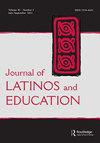Dispossession of Indigenous Knowledge in the Chilean Education System: Mapuche Experiences in Chile
IF 1.1
Q3 EDUCATION & EDUCATIONAL RESEARCH
引用次数: 0
Abstract
ABSTRACTThe article reports on the dispossession of indigenous knowledge in the public education system in Mapuche territory in La Araucanía, a southern region in Chile. The methodology is qualitative, 18 people were interviewed including Mapuche wise men and women, fathers, and mothers who experienced schooling processes in their younger years. The information analysis technique is content analysis, to identify explicit and latent meanings related to the schools they attended and the Chilean education system. Mapuche wise people and parents were consulted on the pedagogical practices of dispossession of ancestral knowledge that have been institutionalized. Main results show that schools have transmitted a Western Eurocentric-based knowledge which results in the dispossession of their own episteme and in their transformation into ordinary Chilean citizens who are unaware of their language and culture as a central axis of their sociocultural identity. Main conclusions account for the historical processes of schooling in an indigenous context, highlighting the consequences that this monocultural education has brought to families, communities, and new generations of indigenous. This poses the challenge of transforming the school curriculum, to transmit their truth, to advance in justice, reparation, and to ensure the non-repetition of the epistemicide of indigenous knowledge in the school.KEYWORDS: Dispossessionindigenous knowledgeschool educationepistemicide AcknowledgmentsAcknowledgments to the project FONDECYT INICIACION N° 11200306 financed by the National Research and Development Agency of Chile (ANID)Disclosure statementNo potential conflict of interest was reported by the author(s).Additional informationFundingThis work was supported by the Agencia Nacional de Investigación y Desarrollo de Chile (ANID) under Grant [N°11200306].智利教育体系中土著知识的剥夺:智利马普切人的经验
摘要本文报道了智利南部La Araucanía地区马普切人领地的公共教育体系中土著知识的剥夺。研究方法是定性的,共采访了18个人,其中包括马普切智者、父亲和母亲,他们在年轻时都经历过学校教育过程。信息分析技术是内容分析,识别与他们就读的学校和智利教育系统相关的显性和隐性含义。马普切智者和父母被咨询剥夺祖先知识的教学实践已经制度化。主要结果表明,学校传播了一种以西欧为中心的知识,结果剥夺了他们自己的知识,并将他们转变为普通的智利公民,他们没有意识到他们的语言和文化是他们社会文化认同的中心轴线。主要结论说明了土著背景下学校教育的历史进程,强调了这种单一文化教育给家庭、社区和新一代土著带来的后果。这就提出了改变学校课程的挑战,传播他们的真相,促进正义和赔偿,并确保在学校中不再发生对土著知识的知识灭绝。关键词:剥夺、土著知识、学校教育、知识灭绝、承认、对智利国家研究与发展署(ANID)资助的FONDECYT INICIACION N°11200306项目的承认、披露声明、作者未报告潜在的利益冲突。本研究得到了智利国家研究与发展机构Investigación (ANID)的资助[N°11200306]。
本文章由计算机程序翻译,如有差异,请以英文原文为准。
求助全文
约1分钟内获得全文
求助全文
来源期刊

Journal of Latinos and Education
EDUCATION & EDUCATIONAL RESEARCH-
CiteScore
2.20
自引率
11.10%
发文量
87
 求助内容:
求助内容: 应助结果提醒方式:
应助结果提醒方式:


